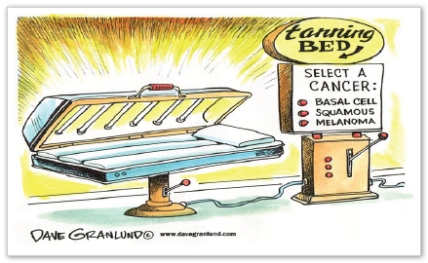To raise awareness of melanoma and other types of skin cancer, and to encourage early detection through self-exams, the American Academy of Dermatology designates the first Monday in May as Melanoma Monday (May 5, 2014) and May as Skin Cancer Awareness Month.
Your risk of getting skin cancer is real. Current estimates are that one in five Americans will develop skin cancer. The American Academy of Dermatology provides several ways to stay skin healthy:
Prevent. Never leave home without the proper sunscreen and enhance your sun protection with a wide-brim hat, sunglasses, shade and dietary supplements.
Detect. Look for new changing, itching or bleeding spots on your skin (see chart above).
Live. Schedule your annual skin exam with one of our dermatologists.
Help us spread the word about the risks of skin cancer on Melanoma Monday and all throughout May. Take the SPOT Skin Cancer Quiz and share it with your family and friends.





